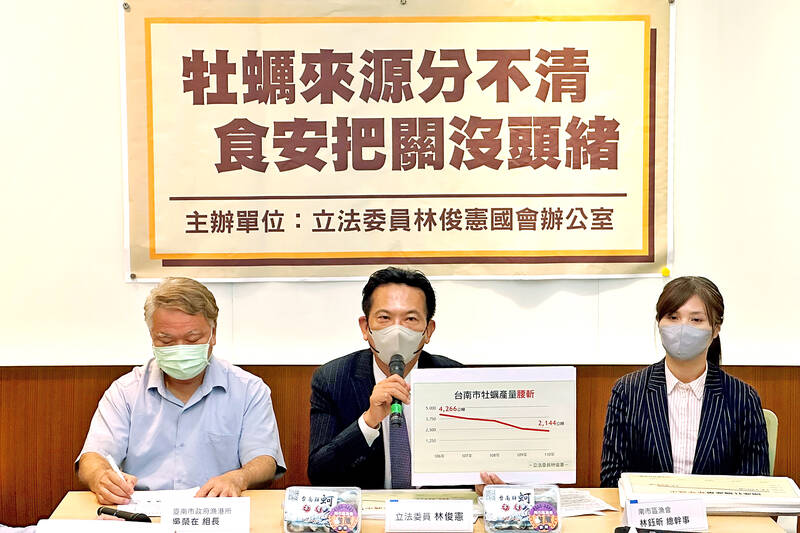The government should examine oysters imported from Vietnam batch by batch after an initial inspection found residual inorganic arsenic exceeding acceptable levels, Democratic Progressive Party (DPP) Legislator Lin Chun-hsien (林俊憲) said on Friday.
The Food and Drug Administration (FDA) said it has flagged Vietnamese oysters as a category 2 inspection item.
Inspections conducted in March found that at least two batches of oysters had more than five times the acceptable level of residual inorganic arsenic, Lin said.

Photo: Chen Cheng-yu, Taipei Times
Domestic sellers started importing Vietnamese oysters in about 2017, as they have a higher profit margin than Taiwanese-grown oysters, he said.
Imports of Vietnamese oysters have increased from 150 tonnes in 2017 to 3,000 tonnes last year, while domestic oyster production dropped from 23,000 tonnes to 18,000 tonnes, he said.
Imported oysters do not have origin labels, and the public would find it difficult to identify the source of oysters if the government does not identify them as a potential threat to Taiwan’s food safety, Lin said.
Chronic consumption of inorganic arsenic can lead to organ failure, and arsenic poisoning is a common cause of blackfoot disease, he said.
FDA North Area Management Center Deputy Director-General Lin Hsu-yang (林旭陽) said that Taiwan has three separate inspection stages: source management, border inspections and domestic inspections.
All imported goods must arrive with a certificate from health authorities in the area of origin, he said.
Border inspections have three levels: routine, more frequent and batch-by-batch inspections, he said.
Vietnamese oysters are now listed as requiring more frequent inspections, he said.
FDA South Area Management Center Deputy Director-General Tsai Chia-fen (蔡佳芬) said the Executive Yuan has convened a cross-agency task force to investigate the issue, adding that the team is reaching out to importers and domestic oyster farmers.
Inspections of 107 farms and importers from December 2021 to December last year has not shown any evidence that importers were attempting to pass off imported Vietnamese oysters as raised in Taiwan, she said.
The FDA would continue to work with business owners and importers to label their products correctly, she said.
Fisheries Research Institute aquaculture processing division head Tsai Hui-chun (蔡慧君) said that Taiwanese-grown oysters were the same species as those from Vietnam and it is difficult to tell them apart.
The institute has established a data archive that could help analyze the oysters, which could provide a basis for the task force to tell local and imported oysters apart, she said.

The brilliant blue waters, thick foliage and bucolic atmosphere on this seemingly idyllic archipelago deep in the Pacific Ocean belie the key role it now plays in a titanic geopolitical struggle. Palau is again on the front line as China, and the US and its allies prepare their forces in an intensifying contest for control over the Asia-Pacific region. The democratic nation of just 17,000 people hosts US-controlled airstrips and soon-to-be-completed radar installations that the US military describes as “critical” to monitoring vast swathes of water and airspace. It is also a key piece of the second island chain, a string of

A magnitude 5.9 earthquake that struck about 33km off the coast of Hualien City was the "main shock" in a series of quakes in the area, with aftershocks expected over the next three days, the Central Weather Administration (CWA) said yesterday. Prior to the magnitude 5.9 quake shaking most of Taiwan at 6:53pm yesterday, six other earthquakes stronger than a magnitude of 4, starting with a magnitude 5.5 quake at 6:09pm, occurred in the area. CWA Seismological Center Director Wu Chien-fu (吳健富) confirmed that the quakes were all part of the same series and that the magnitude 5.5 temblor was

The Central Weather Administration has issued a heat alert for southeastern Taiwan, warning of temperatures as high as 36°C today, while alerting some coastal areas of strong winds later in the day. Kaohsiung’s Neimen District (內門) and Pingtung County’s Neipu Township (內埔) are under an orange heat alert, which warns of temperatures as high as 36°C for three consecutive days, the CWA said, citing southwest winds. The heat would also extend to Tainan’s Nansi (楠西) and Yujing (玉井) districts, as well as Pingtung’s Gaoshu (高樹), Yanpu (鹽埔) and Majia (瑪家) townships, it said, forecasting highs of up to 36°C in those areas

IN FULL SWING: Recall drives against lawmakers in Hualien, Taoyuan and Hsinchu have reached the second-stage threshold, the campaigners said Campaigners in a recall petition against Chinese Nationalist Party (KMT) Legislator Yen Kuan-heng (顏寬恒) in Taichung yesterday said their signature target is within sight, and that they need a big push to collect about 500 more signatures from locals to reach the second-stage threshold. Recall campaigns against KMT lawmakers Johnny Chiang (江啟臣), Yang Chiung-ying (楊瓊瓔) and Lo Ting-wei (羅廷瑋) are also close to the 10 percent threshold, and campaigners are mounting a final push this week. They need about 800 signatures against Chiang and about 2,000 against Yang. Campaigners seeking to recall Lo said they had reached the threshold figure over the